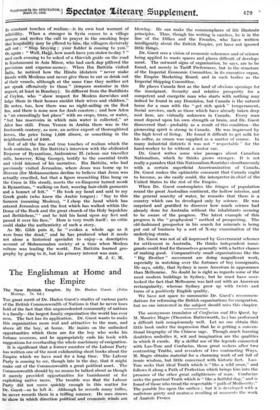The Englishman at Home and the Empire
THE great merit:of Dr. Haden Guest's studies of various parts of the British Commonwealth of Nations is that he never loses hold of the fact that this unprecedented community of nations is a family—the largest family organization the world has ever seen. The fact has its application. Dr. Guest wants to make this organization more real and attractive to the man„ and above all the bOy; at -horne. He insists on the unlimited opportunities which there are for the boy who seeks his fortune overseas, and he appropriately ends his book with suggestions for overhauling the whole machinery of emigration.
It is significant that a fcirrner member of the Labour Party has written one of the most exhilarating short books about: he Empire which we have read for a long, time. The Labour Party is coming to see, though late in the day, that it night make out of the Commonwealth a great political asset. , The Commonwealth should by no means be talked about as though it merely provided opportunities for banishment or for exploiting native races. The trouble was that the Labour Party did not move quickly enough in this matter for Dr. Guest—so he left it. Although he records many trifles, he never records them in a trifling manner. He uses straws to show in which direction political and economic_ winds are blowing. He can make the commonplaces of life illustrate principles. Thus, though his writing is careless, he is in the line of the Dilkes and the Froudes, who have written intelligently about the British Empire, yet have not ignored little things.
Dr. Guest sees a vision of economic coherence and of science being applied to waste spaces and places difficult of develop- ment. The outward signs of organization, he says, are to be found, not merely in Tariff Preferences, but in the structure of the Imperial Economic Committee, in its executive organ, the Empire Marketing Board, and in such bodies as the Imperial Shipping Committee.
He places Canada first as the land of obvious openings for the immigrant. Security and relative prosperity for a competent and energetic man who starts with nothing may indeed be found in any Dominion, but Canada is the natural home for a man with the "get rich quick" temperament. Social services, such as those which have already taken deep root here, are virtually unknown in Canada. Every man must depend upon his own strength or brain, and Dr. Guest discovered that—probably as a result of this condition—the pioneering spirit is strong in Canada. He was impressed by the high -level of living. He found it difficult to get milk for his coffee, as cream was supplied as a matter of course. In many industrial districts it was not " respectable " for the hand-worker to be without a motor car.
Dr. Guest writes some wise passages about Canadian Nationalism, which he thinks grows stronger. It is not really a paradox that this Nationalism flourishes simultaneously with a certain superficial Americanization of Canada. Dr. Guest makes the optimistic comment that Canada ought to become, as she easily could, the interpreter-in-chief of the United States to the rest of the Empire.
When Dr. Guest contemplates the fringes of population round the great Australian continent, the hollow interior, and the general scarcity of water, he remarks that there is a country which can be developed only by science. He was surprised and gratified to discover how much science had already done for Australia without the inhabitants seeming to be aware of the progress. The latest example of this progress is the " geophysical " method of prospecting. The old-fashioned prospector in his search for minerals is being put out of business by a sort of X-ray examination of the underlying strata. Dr. Guest was not at' ail impressed by Government schemes for settlement in Australia. He thinks independent immi- grants could fend for themselves generally with a better chance of making good. Comparatively small organizations like the " Big Brother " movement are doing magnificent work, especially in watching over the fortunes of boy immigrants. He says, oddly, that Sydney is more American in appearance than Melbourne. No doubt he is right as regards some of the most modern buildings in Sydney, but he must have over- looked the fact that Melbourne was laid out with an American rectangularity, whereas Sydney grew up with twists and turns of a positively English quality.
We have not space to summarize Dr. Guest's recommen- dations for reforming the British organizations for emigration, but no one interested in the subject should miss this chapter.
















































 Previous page
Previous page